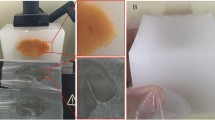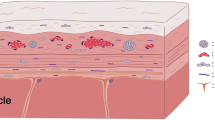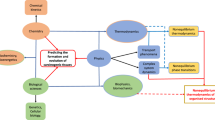Abstract
THE application of the Peltier effect in the preparation of frozen histological sections has been described by Ioffe1and Brown and Dilly2, who cooled the microtome stage by means of thermoelements constructed of semi-conductor materials. Sections of fixed material can be obtained in this way; but it is not possible to cut sections of fresh unfixed tissue by merely cooling the microtome stage. For this purpose it is necessary to cool not only the stage, but also the knife, and although this can be done with solid carbon dioxide the method is not very satisfactory.
This is a preview of subscription content, access via your institution
Access options
Subscribe to this journal
Receive 51 print issues and online access
$199.00 per year
only $3.90 per issue
Buy this article
- Purchase on Springer Link
- Instant access to full article PDF
Prices may be subject to local taxes which are calculated during checkout
Similar content being viewed by others
References
Ioffe, A. F., Semiconductor Thermoelements and Thermoelectric Cooling (Infosearch, Ltd., London, 1957).
Brown, R., and Dilly, M., J. Physiol., 161, No. 1 (1962).
Author information
Authors and Affiliations
Rights and permissions
About this article
Cite this article
HARDY, W., RUTHERFORD, T. Thermoelectric Apparatus for the Preparation of Fresh-Frozen Tissue Sections. Nature 196, 785–786 (1962). https://doi.org/10.1038/196785a0
Issue Date:
DOI: https://doi.org/10.1038/196785a0
This article is cited by
Comments
By submitting a comment you agree to abide by our Terms and Community Guidelines. If you find something abusive or that does not comply with our terms or guidelines please flag it as inappropriate.



